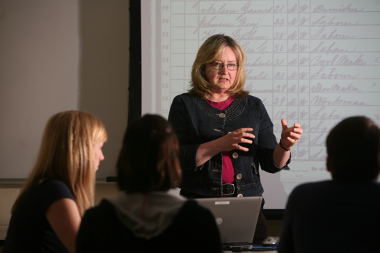

UConn entrepreneurial engineering students who are currently enrolled in ENGR-5300 or students who have successfully completed ENGR-5300 are invited to apply for the “Third Bridge Grant” awards ranging from $10K to $75K per applicant. Other UConn engineering student entrepreneur’s applications may be considered upon the recommendation of the COE Dean and the Third Bridge Principal Investigator Hadi Bozorgmanesh. Between four to seven qualified students led applications will be funded each year. Additionally, the selected student led companies will benefit from mentoring and networking of the Third Bridge Board and Connecticut Innovations.
According to The Kauffman Foundation, nine out of every ten “nascent academic technology entrepreneurs” are graduate students. Yet startups in general and student-led technology, specifically innovation efforts, often languish in the so-called funding “Valley of Death” – the point between a great idea and investible company.
The Valley of Death is an impediment to the success of these startups and the most critical problem in technology commercialization. Studies indicate that 90% of new technology-based ventures that don’t attract investors fail within the first three years. Many academic startups spend the first three years seeking one of the only form of support available to them at this phase, SBIR and STTR. These opportunities are highly competitive and have relatively long award cycles.
The UConn College of Engineering has been fostering entrepreneurial skills and knowhow among students through various venues, including the two-semester “Experiential Technology Entrepreneurship I and II” course. The main objectives of the course include:
- Providing knowledge and experience that graduate students require to gain confidence in their abilities as entrepreneurs and business leaders;
- Providing graduate students with sufficient evidence to convince them that their technology can be the basis of a viable business in the future;
- Nurturing students so they may develop an understanding of the full requirements, capabilities, and technological maturity needed to address market opportunities;
- Enabling graduate students to assess the current state of their technology relative to the requirements;
- Assisting graduate students in launching their startup companies.
This course, over the last two years, has resulted in the launch of more than a dozen student led technology-based companies which are currently in various stages of potential market success. By their nature, many of these businesses tend to be long term high-risk, high-reward startups. The underlying problem is that professional investors want a more proven business model, ready to scale and short-term payback before they invest. Thus, they are less inclined to fund the more risky research and development based efforts.
 The UConn College of Engineering, through funding from Connecticut Innovations, has established “The Third Bridge” as a virtual center focused on identifying promising technologies developed within engineering labs and student innovation to facilitate their path to successful commercialization. The Third Bridge will leverage and significantly expand upon the successful recent experience of the two-semester “Experiential Technology Entrepreneurship I and II” course offered by the College of Engineering, which immerses engineering graduate student teams in the process of commercializing their own innovation and/or UConn-developed technologies. The goal of the grants is to evolve the student’s business idea to the point that it meets the qualifications for SBIR/STTR funding.
The UConn College of Engineering, through funding from Connecticut Innovations, has established “The Third Bridge” as a virtual center focused on identifying promising technologies developed within engineering labs and student innovation to facilitate their path to successful commercialization. The Third Bridge will leverage and significantly expand upon the successful recent experience of the two-semester “Experiential Technology Entrepreneurship I and II” course offered by the College of Engineering, which immerses engineering graduate student teams in the process of commercializing their own innovation and/or UConn-developed technologies. The goal of the grants is to evolve the student’s business idea to the point that it meets the qualifications for SBIR/STTR funding.
Submission to the Third Bridge Grant does not constitute a public disclosure for patenting purposes. The applications will be reviewed by the UConn Third Bridge Board for the sole purpose of evaluating the Grant applications.